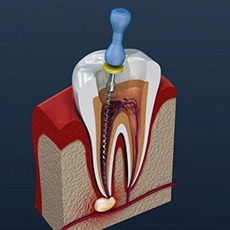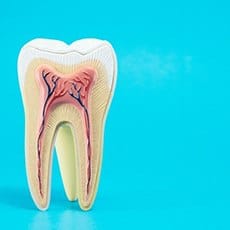Root Canal Therapy – Addison, TX
Stop Dental Pain and Save Your Tooth!

WHY CHOOSE ADDISON FAMILY DENTISTRY FOR ROOT CANAL THERAPY?
-
Advanced Cone Beam
Technology Enhances
Treatment Planning - Calming Sedation Dentistry Provided
- Experienced and Gentle Dental Team
When Are Root Canals Necessary?


Do I Need a Root Canal?
If you notice any of the following symptoms, call your emergency dentist in Addison for a consultation for root canal therapy:
- Severe pain in one tooth
- Prolonged sensitivity to heat and/or cold
- Darkening of tooth enamel
- Swollen gums around a particular tooth
- Inflammation in the gums surrounding a tooth
- Other signs of infection like nausea, fever, or fatigue
How Are Root Canals Performed?
As scary as their reputation may be, there is actually nothing to fear about root canals. The procedure is pretty straightforward. We begin by numbing the area to make sure you won’t feel a thing. Then, we create a tiny hole in your tooth that will allow us access to the center. The damaged pulp and nerve tissues are removed and then replaced with a synthetic material called gutta-percha. Sometimes, we may apply a topical antibiotic to lessen the chances of further infection in the future. The access hole is then sealed back up.
In most cases, we recommend the placement of either a filling or a dental crown. This is because root canal therapy can leave a tooth brittle and vulnerable. To fortify the treated tooth and protect it from damage down the road, a temporary crown is usually placed over the tooth for a few weeks until a permanent crown is ready. Lastly, we may prescribe a round of oral antibiotics just to be on the safe side and prevent infection. Be sure to take your entire prescription, even if you don’t notice any signs of infection, like swelling and fever.


What Happens After Root Canal Therapy?
After a root canal, the majority of patients feel relief from their intense toothache and sensitivity. For a few days following treatment, though, you might feel some soreness and discomfort. This can be managed by taking any prescribed or over-the-counter pain medications as directed on the label. It’s also advisable to avoid chewing on that side of your mouth for a few days. For the first 48 hours after your procedure, there might be minor swelling, which can be mitigated by applying an ice pack in 10-minute intervals. If your pain or swelling persists longer than the first couple of days, call us immediately.


